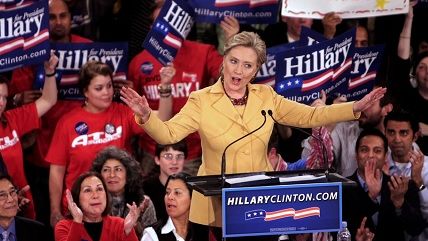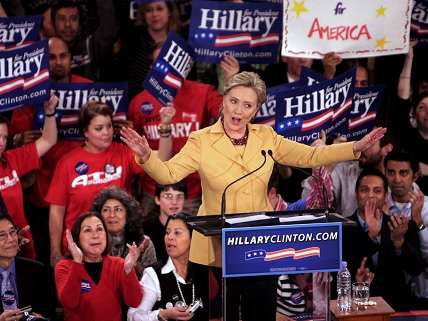Hillary Clinton is Awful
Bernie Sanders isn't the only problematic candidate on the Democratic side.


Hillary Clinton is an awful candidate. She ended up winning last night's Democratic Iowa caucus by .3 percent, and is projected to earn one delegate more than Bernie Sanders did in the contest. The race was so close many of the precinct contests were resolved by coin tosses.
But while Sanders is crushing Clinton in polls in New Hampshire, site of the next presidential contest, things look a little easier for Clinton after that. She's beating Sanders by an almost two-to-one margin in South Carolina. Same in Nevada, where there are fewer available polls. Clinton also still leads nationally.
Sanders' surge started in the summer, and by the time Joe Biden finally announced he wouldn't be running for president, Sanders appeared to be the only anti-Clinton choice. Most of Sanders' success can be attributed to his offer of "free stuff" for everyone. Healthcare is a right, Sanders insisted in his Iowa speech last night. Starting with that premise, why would you means-test?
Sanders won 83 percent of the vote of Democrats who said a candidate who was honest and trustworthy was important to them. Yet Sanders' proposals are not honest. He continues to insist a tax on "Wall Street speculation" will pay for most of his programs, while claiming that higher taxes that "middle class families" would have to pay would be more than offset by lower healthcare premiums. That construction conveniently leaves out the higher overall burden on single people, many of whom are among Sanders' most ardent supporters.
Yet Sanders' brand of "democratic socialism" (that's been repudiated by the same Scandinavian countries Sanders points to as examples) and the novelty of a Democrat actually owning his socialist tendencies should not detract from how awful a candidate Hillary Clinton is, and how awful it is that Democrats produced a race with just two deeply-flawed options.
There is, of course, the e-mail scandal that won't go away. Clinton has tried to paint the investigations surrounding her use of a private server for government communications as a Republican ploy. Yet the investigation is being run by the FBI, out of President Obama's Department of Justice. Most recently, more than 20 of the emails were identified as being classified TOP SECRET, and now one government source told Fox News that information included "operational intelligence," the kind of stuff the intelligence community claims puts lives at risk.
Clinton, then, is being accused of much the same thing Snowden was accused of, though from a different direction. Snowden disclosed information about U.S. surveillance practices to the American public. Clinton kept classified information on an unsecure server, making it easier for foreign agents and hackers to access. The Obama administration has prosecuted more people for mishandling classified information (including whistleblowers) than every previous administration combined. While Clinton now says the entire controversy is based on competing ideas about what ought to be classified, this concern about over-classification is a newfound religion for Clinton. It wasn't on her agenda when she was actually in office and could have done something about it.
Then there's Libya. Many of the Republican candidates supported the U.S. war in Libya and support similar, even more full-throttled interventions elsewhere, and the Republicans ultimately failed in 2011 to stand up to the president and stop the illegal war. For that reason, Clinton largely gets a free pass on the disaster in Libya and how her policy preferences and policy decisions contributed to the destabilization there and in the wider region. Instead, Republicans focus on Benghazi, a smaller subset of the Libya issue, largely surrounding Clinton's lack of transparency and accountability and not how the instability at the root of the Benghazi attacks was a result of Obama-Clinton policies. Clinton's participation in the anti-speech jihad, where she tried to pin the cause of anti-U.S. protests across the Muslim world in 2011 (including what became the Benghazi attack) on a YouTube video and the filmmaker who created it, has gone largely down the memory hole during the campaign. But it reveals a lot about Clinton's moral and political character that she would sacrifice the principle of free speech to avoid taking responsibility for how her foreign policy approach in the Obama administration might have contributed to anti-U.S. sentiment.
Then there's the 1994 crime bill, which President Clinton signed into law and did not repudiate until last year, when the veneer of inevitability around his wife was starting to fade. Hillary Clinton continues to insist the intentions of the 1994 crime bill, which massively grew the U.S. prison population, were positive, that harsher corrective measures were meant to improve people and communities.
In a much-derided Buzzfeed profile, Clinton insisted she wanted her entire political career to revolve around "love and kindness." This is the woman who insisted a "vast right wing conspiracy," and not differences of opinions and questions about character, animated healthy, democratic opposition to her husband's presidency. At a CNN debate last year, she said the enemy she was proudest of was Republicans, who might make up up to a third of the American population. This is a woman who insists she wanted to be about "love and kindness" but her political opponents refused to agree with her politics.
Add to all that the toxic strategy deployed by Clinton's supporters in the political and media class of identifying all dissent and opposition to Clinton as gendered, to the point of creating elaborate strawmen ("Bernie Bros") to impugn the supporters of her only Democratic rival. It could get worse. In the United Kingdom, anti-war activists who engaged female members of Parliament were also called misogynists and abusers. Yet the head of a government as massive as the U.S.'s will, by definition, be an abuser. America can't afford another president who masks their primary role in systemic oppression and government violence with the under the guise of identity politics.
